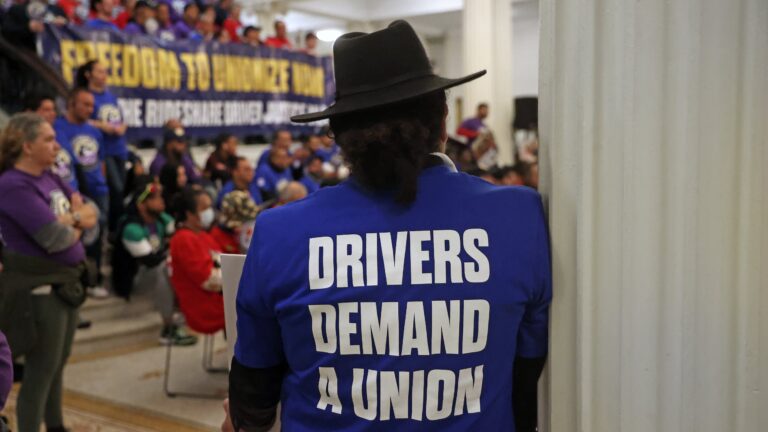
Mass. voters approve Question 3, allowing rideshare drivers to unionize
Politics
Now it’s up to the drivers to decide what’s next.

Massachusetts voters said “yes” to Question 3 on Tuesday, allowing rideshare drivers the opportunity to unionize with 53.9 percent of the vote, with over 94% of precincts reporting.
The passage of Question 3 gives Massachusetts Uber and Lyft drivers the right to organize a union across the state’s rideshare industry, a first in the nation.
If a union is organized, the 70,000-plus drivers in the state will have the right to collectively bargain for better wages and working conditions.
The victory marks the culimination of over two years of organizing across the state by thousands of rideshare drivers, together with the International Association of Machinists and the Service Employees International Union (SEIU) 32BJ.
“With the passage of Question 3, drivers like me can finally have a voice on the job,” said Prisell Polanco, of Newton, who drives for Uber and Lyft, in a statement. “With a union, we can make the multi-billion-dollar corporations hear our needs, and we can fight for a rideshare industry that supports drivers and is safe for passengers.”
What does Question 3 propose?
Drivers must next form a union to collectively bargain. If they opt to unionize, the proposal stipulates that the state oversees the union’s operations.
The measure also defines who is and isn’t an “active driver.” According to the measure, an active driver is someone who has “completed more than the median number of rides in the previous six months.”
According to the proposed law, rideshare companies would be required to bargain with the driver organization every three years. Agreements reached between companies and the union would be voted upon by active drivers.
If the companies and drivers reach an agreement, the drivers give the state Secretary of Labor the power to approve or disapprove the agreements.
Advocate group Vote Yes on 3 claimed that rideshare drivers are “struggling to support their families ” and that a union would give them a chance to challenge rideshare companies’ “unfair practices.”
The majority of rideshare rides in Massachusetts are done by drivers working more than 10 hours a week and make up a significant portion of their ability to make ends meet, the Yes on 3 said in a statement.
When drivers are deactivated from the apps, their “bread and butter” evaporates, the advocacy group said. Drivers highlighted the need for a “voice on the job,” a fair process to deal with sudden deactivations and a way to demand higher pay.
“Working people in Massachusetts have won a monumental victory with Question 3 — one that expands labor law in the state to finally include rideshare drivers,” said Roxana Rivera, 32BJ SEIU Assistant to the President and co-chair of the Yes On 3 campaign, in a statement.
“SEIU 32BJ has always backed working people in their big fights to achieve big things, and Question 3 is no different,” Rivera continued. “We expect prompt implementation and are excited to support Massachusetts’ rideshare drivers as they build their union.”
The Boston Globe’s editorial board endorsed a “yes” vote on Question 3, saying a union for divers could “set an important precedent” for the rest of the country.
Opponents of the ballot question from the Massachusetts Fiscal Alliance said a union would raise the price of rides and that the measure “does not really create bargaining” for rideshare drivers. The group declined to comment on the vote results but said in a statement to Boston.com that it is “ideologically opposed” to the ballot question.
Vote Yes on 3 posted photos of drivers giving speeches at their results watch party Tuesday night.
A huge THANK YOU to voters in MA who recognize that rideshare drivers need a union. Your vote gives Cletus and thousands of other drivers power and a voice on the job 💪 pic.twitter.com/uSqJCc7gKK
— VoteYesOn3MA (@VoteYesOn3Mass) November 6, 2024
What comes next?
The first step towards unionization is to collect signatures from at least 25 percent of active drivers.
The backers of the question, 32BJ and the Machinists, say they are committed to continuing their support for the drivers as they work towards creating a union.
“We cannot wait any longer to begin to exercise our union rights – the same union rights that have provided millions of workers in Massachusetts and across the country with secure, good-paying jobs,” said Yosef Woldeyes, of Dorchester, who drives for Uber and Lyft, in a statement.
“Drivers like us are parents, grandparents, siblings, neighbors and members of Massachusetts communities who depend on our jobs to provide for our families,” Woldeyes continued. “With a union, we can sit down with Uber and Lyft and shape a rideshare industry that works for all of us – drivers and riders.”
2024 Election: Share your reactions to Question 3 results
Boston.com Today
Sign up to receive the latest headlines in your inbox each morning.
